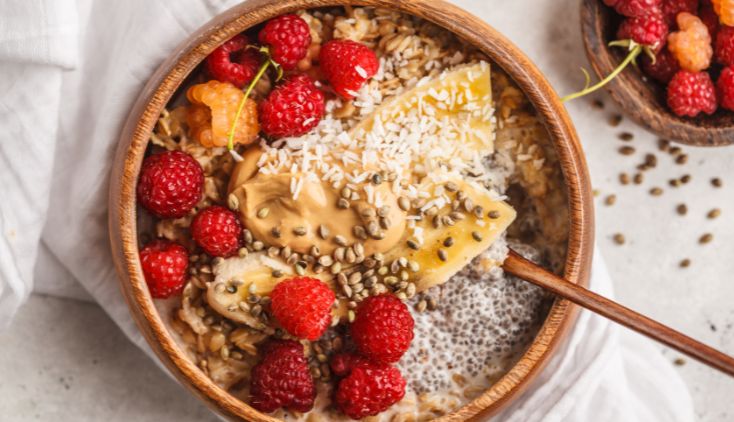Incorporating Foods and Supplements into Your Diet
With the right approach to nutrition and targeted supplementation, you can take care of your digestive system and experience the benefits of optimal gut health. In this article, we look at foods and supplements for gut health that you can easily add to your diet.
Top Supplements for Digestive Wellness
Emma
Emma is a digestive health supplement. It addresses the root causes of digestive dysfunction by targeting methane-producing bacteria that contribute to bloating and constipation. Unlike traditional supplements that focus on single issues, Emma takes a multi-faceted approach to gut restoration.
This groundbreaking supplement combines powerful digestive enzymes with carefully selected botanicals that support healthy bowel movements and reduce uncomfortable gas production. Emma's unique blend includes ingredients that strengthen the intestinal barrier while promoting the growth of beneficial bacteria strains. Users often report significant improvements in bloating, regularity and overall digestive comfort within weeks of consistent use.
Advanced Probiotic Formulas
Modern probiotic supplements have evolved and now contain sophisticated blends of beneficial bacteria and yeasts. The most effective formulas contain spore-based probiotics that survive stomach acid and grow in the intestines more effectively than traditional strains.
Multi-strain probiotics that include lactobacillus, bifidobacterium and bacillus species provide comprehensive support for different areas of the digestive tract. These supplements help crowd out pathogenic bacteria, enhance immune function and produce beneficial compounds like short-chain fatty acids that nourish intestinal cells.
Comprehensive Enzyme Complexes
Enzyme supplementation becomes increasingly important as we age and our natural production declines. Full-spectrum enzyme formulas contain not only the basic protein, fat and carbohydrate-digesting enzymes but also specialized enzymes for breaking down fiber, dairy and other challenging food components.
These supplements can dramatically improve nutrient absorption while reducing the digestive burden on your system. Many people find that enzyme supplementation eliminates food sensitivities and allows them to enjoy a more varied diet without discomfort.
Gut Barrier Support Nutrients
Zinc carnosine and L-glutamine work synergistically to repair and maintain the intestinal lining. These nutrients provide the building blocks necessary for cellular regeneration in the gut wall, helping to prevent leaky gut syndrome and maintain proper barrier function.
Collagen peptides offer additional support by providing amino acids that strengthen connective tissue throughout the digestive tract. Regular supplementation can help heal damage caused by inflammation, stress or poor dietary choices.
Prebiotic Fiber Supplements
Targeted prebiotic supplements feed beneficial bacteria more efficiently than dietary fiber alone. Inulin, fructooligosaccharides and galactooligosaccharides serve as preferred fuel sources for specific bacterial strains that produce beneficial metabolites.
These supplements help establish a thriving bacterial ecosystem that supports immune function, mood regulation and metabolic health. Unlike some fiber supplements that can cause gas and bloating, properly formulated prebiotics are generally well-tolerated and provide sustained benefits.
Transformative Foods for Gut Restoration
Living Foods
Naturally fermented foods provide living cultures that boost your digestive tract with beneficial microorganisms. Raw sauerkraut contains diverse lactobacillus strains along with vitamin C and beneficial organic acids that create an optimal environment for good bacteria to flourish.
Authentic miso paste made through traditional fermentation processes delivers beneficial bacteria along with enzymes that aid digestion. The fermentation process also creates unique compounds that support liver detoxification and cardiovascular health.
Resistant Starch
Green bananas and potatoes provide resistant starch that passes through the small intestine undigested, serving as premium fuel for beneficial bacteria in the colon. These bacteria ferment resistant starch into butyrate, a short-chain fatty acid that nourishes intestinal cells and reduces inflammation.
Raw oats soaked overnight become more digestible while maintaining their prebiotic properties. This preparation method increases the availability of beneficial compounds while reducing antinutrients that can interfere with digestion.
Polyphenol-Rich Plant Foods
Wild blueberries and other dark berries contain anthocyanins and other polyphenols that beneficial bacteria metabolize into anti-inflammatory compounds. These plant chemicals also help maintain the integrity of the gut lining while supporting healthy bacterial diversity.
Extra virgin olive oil provides oleic acid and polyphenols that promote the growth of beneficial bacteria while inhibiting harmful strains. The anti-inflammatory properties of high-quality olive oil extend throughout the digestive tract.
Organic green tea contains catechins that act as natural antimicrobials against pathogenic bacteria while supporting the growth of beneficial strains like lactobacillus and bifidobacterium.
Traditional Healing Foods
Homemade vegetable broths simmered for hours extract minerals and gelatin that support gut lining repair. Adding seaweed to broths provides iodine and other trace minerals while contributing prebiotic compounds that feed beneficial bacteria.
Raw honey contains beneficial enzymes, prebiotics and antimicrobial compounds that support digestive health. The oligosaccharides in raw honey selectively feed beneficial bacteria while inhibiting harmful microorganisms.
Sprouted seeds and legumes provide enzymes and increased nutrient availability while being easier to digest than their unsprouted counterparts. The sprouting process reduces antinutrients and creates beneficial compounds that support gut health.
Keep reading to learn about common signs of ulcerative colitis.
